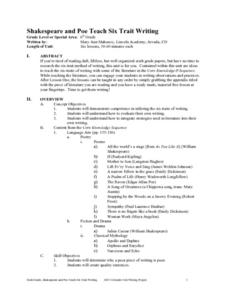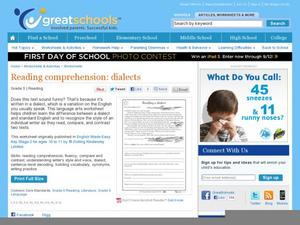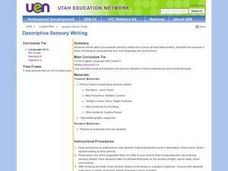EngageNY
Figurative Language and Word Choice: A Closer Look at Bud, Not Buddy (Chapter 2)
The difference between an average and an unforgettable writing can lie in the author's word choice. The figurative language in Chapter 2 of Christopher Paul Curtis's Newbery Medal Winner, Bud, Not Buddy, is the focus of a series of...
Curated OER
So Much Depends Upon...Sixteen-Word Imagery Poems Inspired by Love that Dog by Sharon Creech
After reading Love That Dog by Sharon Creech (and possibly shedding a few tears), middle schoolers work on their own sixteen-word poems with a Six Trait writing activity. They focus on word choice in this activity to capture an...
Curated OER
Shakespeare and Poe Teach Six-Trait Writing
A Six-Trait Writing instructional activity helps your middle schoolers liven up their word choice and shows them how to evaluate their own writing. Class members take a close look at the language used in poems by Shakespeare, Kipling,...
Curated OER
Strong Descriptive Writing: James and the Giant Peach
Support your writers! Clear procedures and appropriate support make this a superb resource for elementary writing instruction. Ready your class to compose original descriptive paragraphs inspired by the episode in Roald Dahl's James and...
Curated OER
The Tell-Tale Hearts of Writers
Knock, knock, knock...Creep out your class with a critical thinking lesson focused on word relationships in Edgar Allen Poe's "The Tell-Tale Heart." They investigate the relationship between word choice, mood, and interpretation of a...
Curated OER
"Knot" the Whole Truth: Writing a Modern-Day Story with a Tall Tale's Voice
Beyond Paul Bunyan and his blue ox, tall tales can be a great way to teach young writers about word choice and voice in their writing. Using Jerry Spinelli's Maniac Magee and the Six-Trait Writing process, they begin to write their own...
Curated OER
Compare and Contrast Poems vs. Lyrics
Combine your pupils' love of music with their growing knowledge of poetry! First, have them bring in their favorite songs for a discussion on word choice and literary devices. Then, use a Venn Diagram to compare and contrast the...
EngageNY
Writing: Drafting Body Paragraphs and Revising for Language
Begin the drafting phase of the writing process with a lesson plan focused on logically writing three body paragraphs. Then, revise the writing to make it more formal after a teacher-directed mini-lesson plan. Each paragraph highlights...
Curated OER
Reading a Dialect
Reading a dialect can be difficult; show readers that it can also reveal fascinating details! They read two extracts from Jane Gardam's The Hollow Land, which is written in a British dialect. Readers answer comprehension questions,...
Curated OER
Descriptive Prompt: Precise Language
Incorporate sensory details into a piece of descriptive writing. First, elementary and middle schoolers improve a piece of writing by using precise, vivid language, as well as appropriate word choice. They then listen to a variety of...
Curated OER
Comparing Two Stories
Compare new and old versions of the classic story Alice in Wonderland in this comprehensive worksheet packet. Learners read an excerpt from the original, answering several analysis questions. They do the same for a more modern version,...
Novelinks
The Little Prince: Brainstorming Activity
What do you think of when you hear the word adult? Or friend? Learners brainstorm with a group of peers to list the words they think of when they hear seven words from Antoine de Saint-Exupéry's The Little Prince.
Curated OER
Reliving History through Slave Narratives
Helpful for an American literature or history unit, this lesson prompts middle schoolers to examine slavery in the United States. They read slave narratives that were part of the Federal Writers' Project and then conduct their own...
E Reading Worksheets
Tone Worksheet 3
The interpretation of a poem often lies in the mind of its reader, especially when reading the tone. Focus on author's word choice, middle schoolers read four different poems and briefly state a perceived tone for each, along with the...
Novelinks
Walk Two Moons: Story Impressions
Story chains connect literary concepts, reinforce context clues, and even help learners predict what's coming next! Using words from the next chapter of Sharon Creech's Walk Two Moons, middle schoolers craft story chains to determine...
Curated OER
Analogies
When you understand the relationships between words, your vocabulary and reading skills will increase! Work on a set of analogies with multiple choices for learners to select.
Curated OER
Understanding Fantasy
Explore fantasy as a genre. After working in small groups to identify literary elements in The Lion, the Witch, and the Wardrobe by C.S. Lewis, class members share their work and then use the presentations to help them prepare to write...
Curated OER
The Ultimate Survivor Using Hatchet by Gary Paulsen
What items would you need to survive if you were stranded in a remote place? Using chapter 10 of Gary Paulsen's Hatchet, middle-schoolers work through a Six Trait writing activity to create a story about their own survival in a similar...
Curated OER
Comparing Poems
Young literary analysts compare two poems by the same author. Readers look for slant rhyme, observe the beat and rhythm of each, and search for repeated vowel sounds. After re-reading, they observe the lack of punctuation and the stanza...
EngageNY
Introducing “If” and Noting Notices and Wonders of the First Stanza
After reading chapter 14 of the story Bud, Not Buddy by Christopher Paul Curtis, scholars take part in a read-aloud of the poem If by Rudyard Kipling and compare it to the reading of Bud, Not Buddy. Learners then go deeper into the poem...
Curated OER
The Adventures of Tom Sawyer
Students identify lightning words from The Adventures of Tom Sawyer to complete definition and synonym activities. In this word study lesson plan, students discuss lighting words and read a Mark Twain quote. Students then read specific...
Curated OER
Example of a Description of Action
Read the descriptive paragraph (included) with your middle schoolers, and have them study the stylistic elements included. They'll look for vivid verbs, alliteration, assonance, similes, and personification. Before writers craft their...
Curated OER
The Adventures of Tom Sawyer: Using Vivid Language
Analyze the components of precise wording and vivid language in this language arts lesson plan. Middle school writers illustrate a passage from Mark Twain's The Adventures of Tom Sawyer, and write a response to a Norman Rockwell print....
Curated OER
Rest in Peace, Maniac Magee
Scholars read Maniac Magee and create epitaphs for each of the major characters using precise words reflecting the individual characters personality and nature. They will learn what an epitaph is and practice writing their own. They can...
Other popular searches
- Word Choice in Writing
- Revise Word Choice
- Writing Revision Word Choice
- Word Choice 6 1 Writing
- Word Choice Writing

























